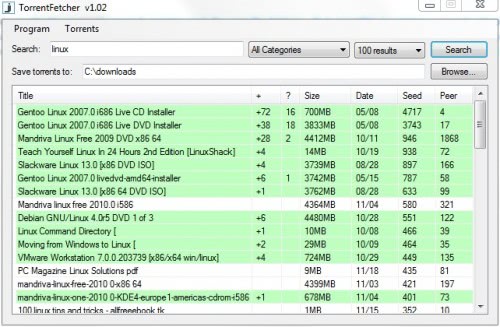Torrents are somewhat amazing to me. A torrent is defined as “a stream of water flowing with great rapidity and violence,” or a “violent downpour of rain.” Oh wait, that’s not what we’re talking about, is it? A torrent is also described as “a rushing, violent, or abundant and unceasing stream of anything.” That’s getting a little closer, and I would bet that that is where torrents get their name. The torrents this blog will discuss are also known as bit torrents. A bit torrent is defined as a “pointer file used for file sharing.” Basically, when you download a torrent you are taking bits of different files from different users all over the internet. It is a file sharing network that allows you to quickly download things from other people who are a part of that file sharing network. So what are you downloading when you download a bit torrent? These files can really be anything. The most popular are music and movies, but there are also copies of operating systems, instruction manuals, Microsoft Office, computer games, pictures, and all manner of different computer programs and software.
What amazes me about torrents is the volume. I mentioned earlier that describing torrents as an “unceasing stream of anything” might have been where they got their name. I believe this to be true because there is simply no end to the effervescence of illegal materials that are available and growing online. Living in college dorms for two years I saw endless gigabytes of torrents downloaded to my friends computers. It was commonplace to see 500 gig hard drives in every dorm room my freshman year. Sure, in high school I heard about a few people getting caught with downloading music and movies, but only like 2 or 3 people out of hundreds that I knew were doing it. I really think that that was a scare tactic. I heard of a few people being caught who were going to have to pay a few slap-on-the-wrist fines, and I never heard anything else about it.
Torrents are not legal, but it seems that nothing is being done to stop them. Perhaps there is just too much of it that prosecuting everyone who has committed this crime will take too long. But just because there are so many people doing it does not mean that it is right or that we should allow it. I don’t propose any solution because in all likelihood there probably is no good solution on how to stop this from happening. However I don’t understand why these websites can stay open when there is so much illegal digital media passing through their hubs. I assume that the sites aren’t actually breaking any laws because they aren’t hosting the files themselves, and if law enforcement agencies report on an illegal or copyright link or file, the site just closes that link or file down, and someone opens five more to replace it. Gotta love the legal system…


